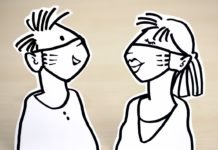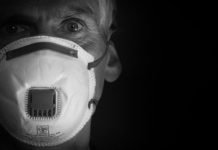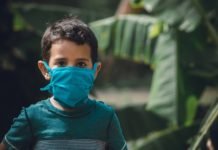This study aims to assess the anxiety, depression and stress level of students during COVID-19 outbreak. The online questionnaire surveyed 80 students from the 250 population of MBA in Western Odisha, India. Two steps analysis have been done using EXCEL and MAXQDA software. The data collected were inserted in EXCEL and were analyzed by descriptive statistics (frequency distribution, mean and standard deviation) for the DASS21 questionnaire. Content analysis for open ended questions was carried out with the help of MAXQDA Software. The inferential statistics suggests that the level of depression was as high as 43% among the students (Mean 8.7, SD 6.047073). The main reasons for depressions among students are mental tension, career and negative psychology (maximum hits ranging 80%) and also other factors such as economic downturn, financial issues, future life, social distress, satisfaction in life, and job offers revoked (hits ranging from 73-46% observed) as revealed by Content Analysis. The institutions should adopt an online method of psychosocial intervention to reduce the depression level of the students.
Coronavirus (COVID-19) is a pandemic associated with severe respiratory syndrome. It originated from Wuhan, China, in December 2019. The World Health Organization (WHO) on 30th January 2020 showed concern for this disease and affirmed it as a Public Health Emergency of International Concern and on 11th March 2020 accepted this as a pandemic. The ongoing pandemic COVID-19 has been announced by the World Health Organization as the sixth public health emergency of international concern. In December 2019 in China Coronavirus was first spotted. People suffering from Corona show symptoms of fever, dry coughing and breathlessness (Guan et al. 2020 and Holshue et al. 2020). Million cases of COVID-19 have been reported throughout the world resulting in more than 170,000 deaths. As the numbers of cases are increasing in different countries around the world, the anxiety symptoms are also rising among the communities.
Anxiety levels will definitely rise but the question is how to manage this stress before it becomes devastating. It is quite natural that people will go through great stress and bigger anxiety symptoms due to this pandemic. General public is frightened and there is fear among the mass relating to their health and wellbeing of their loved ones, economic downturn and uncertainty about the future. The media coverage is also feeding to the anxiety levels. Quarantine and social isolation can add to the stress and anxiety levels and may lead to increase one’s signs of depression.
Studies conducted on the impact of quarantine and social isolation after the outbreak of severe acute respiratory syndrome (SARS) in 2003 and 2014. Ebola outbreak has reported negative psychological effects on the mass including post-traumatic stress symptoms, confusion, and anger. The stressors after long quarantine duration are mostly fears of infection, frustration, boredom, inadequate supplies, inadequate information, financial loss, and stigma.
A comparative study by Wang et al. (2011) on undergraduate students who were quarantined with those not quarantined reported that there exists no significant difference between the two groups with respect to general mental health problems. Since the study only took the young students population perhaps the result reported came out to be such due to the fact that young people generally have less responsibilities than adults and therefore this conclusion cannot be generalised.
Rubin (2020) writes that the profits of compulsory mass quarantine need to be evaluated cautiously against the psychological costs. As far as possible, the use of quarantine and lockdown as measures to protect the public health should be reduced, as there are negative consequences associated with it.
Review of literature shows that the psychological shock of quarantine is extensive, considerable, and long-term in nature. Quarantine and lockdown of the general mass should be used in extreme conditions. On the other hand, the psychological outcomes of not using quarantine and lockdown and allowing the disease to infect the mass might be worse (Hull 2005). So it requires a judicious decision before implementing such measures weighing both the pros and cons because withdrawing liberty for the wider public good is often a debatable issue. If quarantine and lockdown is essential, steps should be taken to ensure that this is bearable for the mass.
Studies on the disaster mental health have reported on the results of traumatic and post-traumatic stress disorders on communities. Recently some studies have been conducted to extend the positive view on mental health (Herrman 2012; Wade et al. 2012). The approach is to bring people from illness to a normal state, and to make them powerful to achieve a positive level of mental health (Seligman 2011).
Epidemic outbreaks generate numerous challenges in bring back good health in between the beginning of an infection and healing. There exists a long-term internal suffering of families of those who have seen death in their family due to the disease and they demonstrate a mental “iceberg effect.” In the individual level, pandemic causes vulnerabilities, social stigma, distress, and isolation and the individuals may experience fear, anxiousness, numbness, and detachment. On a community level, the whole community can experience fear and isolation during and after an infectious disease pandemic. This has been seen during the 2009–2010 H1N1 influenza pandemic. Individuals of USA experienced confusion, anxiety, and increased risky behaviours like smoking, drinking, drug misuse, recklessness, and unsafe work practices because of a sense of uncertainty. There were concern about the availability of medicines, shortages of workforce, and strategies to lessen the problem (Pfefferbaum et al. 2012). Public health workers and their families too experience some of these mental health issues.
This new pandemic COVID-19 is causing anxiety because of its instantaneous nature of transmission, its mortality statistics, its overestimation by the infected, uncertainty about the future, the economic affects, the distrust of adequate prevention of the disease and necessary availability of heath care facilities. Anxiety affects the immune system and thus the risk of the virus infection increases. Public’s anxious reactions gives rise to public disruptive behaviors such as people rushing to stores, health care centers, medicine stores, and therefore health care service system gets affected (WHO 2020).
COVID-19 PANDEMIC AND STUDENT’S MENTAL WELL-BEING
During our literature review we have come across very little number of researches on the mental well- being of students during a pandemic. Desai (2020) write about the anxiety among the American students reports that for low-income students, the closer of the colleges because of COVID-19 is not a matter of rejoice, they said, “It’s been really chaotic”. The uncertainty of getting the degree is a matter of concern for many students. Colleges in US have sent all their students home for the rest of the year. Shutting down a campus is a setback in career for most of the students and they term this closure as a fire-alarm for their career. Students from reputed institutions like Harvard may be able to deal with the financial and academic fallout of a pandemic-triggered school shutdown, but many students elsewhere aren’t at all prepared to absorb the shock. Many students do not have reliable internet access for online classes. In India too, all the academic institutions have been closed down. In this present scenario, the anxiety among the students is rising. Due to coronavirus pandemic, students and faculty members are facing stress caused due to the disturbance in their personal and work lives. To cope up in such a public health crisis and to maintain sound mental health, both the students and the teachers are to rely on each other. In this study, we aim to assess the anxiety, depression and stress level of Indian students during COVID-19 outbreak and the reasons for such fear and anxiety.
MATERIALS AND METHODS
Design and sampling
The study was an online survey conducted among the post graduate level final year students of management studies (MBA Students) conducted in Western Odisha, India. There were around 100 students in total enrolled in a premier central government institution in this part of the country. The students from this institution were chosen on the basis of their final campus placement for jobs and reliable internet availability at their home. Since the campuses are locked down the students are available in their home, convenient sampling was done on the basis of reliable internet access available to the students. 90 students were sent the questionnaire and out of them 83 responded. 3 responses were incomplete so they were not included. The sample size required with a margin of error 5% and confidence level 95% was 80. Thus, we calculated the results with 80 responses only.
Data collection tools
DASS21 questionnaire was applied to collect the data to assess the Depression, Anxiety and Stress level of the students. The Depression, Anxiety and Stress Scale – 21 Items (DASS-21) is a set of three self-report scales designed to measure the emotional states of depression, anxiety and stress developed by Lovibond, S.H. & Lovibond, P.F. (1995). The questionnaire was obtained from the Manual for the Depression Anxiety & Stress Scales (2nd Ed.)Sydney: Psychology Foundation. A set of eight open ended questions were also developed to find out the reasons for their Depression, Anxiety & Stress. The validity and reliability of the DASS21 questionnaire have been confirmed by national and international studies. The Cronbach’s alpha was also calculated using SPSS for three subscales which shows 0.740 for anxiety, 0.812 for depression and 0.785 for stress subscale. Thus, the Alpha coefficients for all the subscales (depression, anxiety and stress) are acceptable in the present research and there exists internal consistency of the subscales.
The DASS21 questionnaire which assessed autonomic arousal, skeletal muscle effects, situational anxiety and subjective experience of anxious impact was reported by the students. They were made aware of the prevailing situation due to Corona pandemic.
Secondly, the researchers also used eight open ended questions to collect the comprehensive views of students on the Covid 19 pandemic situations and how it had impacted on them during the lockdown.
The data collection process took 10 days (5th April 2020 to 15th April 2020). At the beginning of the online survey, a full explanation on the purpose of the study was intimated to the students and their consent to participate in the study was obtained. The questionnaire was designed using Google form and the students were shared a link created to take part in the survey. All the closed ended and open ended questions were fed into the forms for the survey purpose. Students were also requested to fill the survey questionnaires through a separate mail.
Data analysis method
We used two step analysis using Excel and MAXQDA software. The quantitative data collected were inserted in EXCEL and were analyzed by descriptive statistics (frequency distribution, mean and standard deviation) for the DASS21 questionnaire. The Content analysis for open ended questions was carried out with the help of MAXQDA Software. All the responses were first arranged in excel file in supporting format and imported in the software. The codification was done with the help of intuition and judgments. The various thematic and systematic codes were generated for the analysis purpose. Further, all the responses were retrieved into the segments using category wise survey responses. All the outputs were exported using excel file and interpretation was done.
DATA ANALYSIS AND RESULTS
Depression, Anxiety and Stress Measurement (DASS Analysis)
Quantitative Analysis
From the Table I illustrated below, it is indicated that the depression level among students was normal (57%), Mild (23%), Moderate (14%) and Severe (6%). Besides, the analysis also indicates that the Anxiety level was noted as Normal (84%), Mild (6%) and Moderate (10%). The results also demonstrate that the Stress level was 89% normal and 11% mild among the students. As shown in the table, it is observed that the depression level was recorded high (43% falls under the range of mild, moderate and severe) among students compared to anxiety and stress.
| Table I: Level of Depression, Anxiety and Stress in Students | ||||
| Depression Level among Students during Covid Pandemic | ||||
| Severe | 5 | 6% | Mean | 8.7 |
| Moderate | 11 | 14% | SD | 6.047073 |
| Mild | 18 | 23% | ||
| Normal | 46 | 57% | ||
| N | 80 | 100% | ||
| Anxiety Level among Students during Covid Pandemic | ||||
| Severe | 0 | 0% | Mean | 3.95 |
| Moderate | 8 | 10% | SD | 3.987004 |
| Mild | 5 | 6% | ||
| Normal | 67 | 84% | ||
| N | 80 | 100% | ||
| Stress Level among Students during Covid Pandemic | ||||
| Mild | 9 | 11% | Mean | 7.525 |
| Normal | 71 | 89% | SD | 4.701131 |
| N | 0 | 0% | ||
| Source: Developed for Research by Authors | ||||

Graph 1: The Graph showing the level of depression among students

Graph 2: The Graph showing the level of Anxiety among students

CONTENT ANALYSIS OF STUDENTS RESPONSES
Qualitative Analysis
SPREAD OF CORONAVIRUS (COVID 19) AND ITS IMPACT ON STUDENTS MENTAL STATUS
From the Content analysis of the responses collected from students, it is indicated that most of the students were feeling tensed and pressurised due to the adverse situation of COVID 19. The reasons behind the same were being observed as slowdown economy, career path, family problems, lockdown situation, home quarantine, losing of job, job crisis, pandemic environment in the country, spread of rumours etc. Please refer Table II.
| Table II: Theme: Covid 19 pandemic and its impact of students mental health |
| Responses | Major Factors Indicated |
| None | |
| Career growth in economic slowdown | Slowdown, Career path |
| As of now am not facing anything like that | |
| it should not spread to my family | Family |
| No mental pressure for any impact on me personally. I am just worried for the future consequences of this pandemic. Like in job life, economy of the country, impact on poor etc. | Pandemic, Job |
| While thinking about the impact of COVID-19 on the less fortunate, driving millions back to poverty, I feel like I need to do something but I don’t know where to start, so I feel lost and a bit tensed. | |
| Losing job | Job |
| Worried about career progression | Career path |
| Career growth in economic slowdown | Slowdown, Career path |
| No idea | |
| Career growth in economic slowdown | Slowdown, Career path |
| Just concerned about my campus job offer security | Job |
| No major tension | |
| Rumours, negative news/information, spread of incorrect information create the mental pressure | |
| Fear of job crisis | Job |
| Spread of virus is very pandemic. Just to buy some necessary items also some time I get tensed and helping some people also makes me tensed. | Pandemic |
| In this lockdown.. I want to go home | Lockdown, Home |
| I want to leave | |
| Pandemic situation may result some losses | Pandemic |
| Job Loss | Job |
| Fear of job | Job |
| None | |
| None | |
| None | |
| As of now am not facing anything like that | |
| Career growth in economic slowdown | Slowdown, Career path |
| No idea | |
| In this lockdown.. I want to go home | Lockdown, Home |
| Not facing any challenge | |
| No Opinion | |
| Career on stake | Career path |
| No idea | |
| Career growth in economic slowdown | Slowdown, Career path |
| None | |
| No idea | |
| Go home feeling | Home |
| In this lockdown.. I want to go home | Lockdown, Home |
| No idea | |
| None | |
| it should not spread to my family | Family |
| In this lockdown.. I want to go home | Lockdown, Home |
| No idea | |
| None | |
| As of now am not facing anything like that | |
| None | |
| it should not spread to my family | Family |
| None | |
| In this lockdown.. I want to go home | Lockdown, Home |
| In this lockdown.. I want to go home | Lockdown, Home |
| None | |
| it should not spread to my family | Family |
| None | |
| None | |
| None | |
| None | |
| None | |
| None | |
| None | |
| As of now am not facing anything like that | |
| None | |
| None | |
| None | |
| As of now am not facing anything like that | |
| None | |
| it should not spread to my family | Family |
| None | |
| it should not spread to my family | Family |
| None | |
| None | |
| it should not spread to my family | Family |
| As of now am not facing anything like that | |
| None | |
| None | |
| it should not spread to my family | Family |
| None | |
| None | |
| No idea | |
| it should not spread to my family | Family |
| None | |
| As of now am not facing anything like that |
Source: Data Interpretation result output from MAXQDA Software
STUDENTS CAREER AND OUTBREAK OF COVID 19
Most of the students were worried about their offers from companies. They were tensed because they were feeling insecured if they could be able to join the company and if yes, that may get affected due to economic slowdown. The common reasons of worries among students were job opportunities, delay in joining companies, coronavirus, and delay in start of career. Table III shows the results.
| Table III: Theme: Covid 19 pandemic and its impact of students career | ||
| Respondents | Responses | Major Factors Indicated |
| RESP01 | No | |
| RESP02 | yes, less opportunity and more demand | Opportunity |
| RESP03 | Not at all | |
| RESP04 | Yes, as most of the joining are delayed and some offers are getting cancelled | Joining, Delay Career |
| RESP05 | Covid 19 | |
| RESP06 | Covid 19 | Covid |
| RESP07 | Yes. The company rescinded my job offer | |
| RESP08 | Yes. My final placement offer has been rescinded by the company due to Covid-19 | Covid |
| RESP09 | yes, less opportunity and more demand | Opportunity |
| RESP10 | No danger now | |
| RESP11 | yes, less opportunity and more demand | Opportunity |
| RESP12 | Because I am not sure when I ll be able to join and that too if my offer is not rescinded. And if it is rescind, then i ll have to start at a very low pay, making no sense of doing this mba after two years of workex | |
| RESP13 | Yes… Job offers may be revoked as companies are facing losses | |
| RESP14 | No, I am not feeling unsecured about my career. | |
| RESP15 | yes, fear of losing/not getting job in a depressing economy | |
| RESP16 | Yes, as many companies are revoking the offer letters | |
| RESP17 | No, Opportunities might get delayed due to COVID-19,but things may get back to normal | Covid, Delay Career |
| RESP18 | No danger now | |
| RESP19 | Companies may withdraw job | |
| RESP20 | Companies may not take us | |
| RESP21 | Fear of jon loss | |
| RESP22 | No | |
| RESP23 | No | |
| RESP24 | No | |
| RESP25 | Not at all | |
| RESP26 | yes, less opportunity and more demand | Opportunity |
| RESP27 | No danger now | |
| RESP28 | No, Opportunities might get delayed due to COVID-19,but things may get back to normal | Covid, Delay Career |
| RESP29 | Not at all | |
| RESP30 | No issue | |
| RESP31 | Less market opportunity | Opportunity |
| RESP32 | No danger now | |
| RESP33 | yes, less opportunity and more demand | Opportunity |
| RESP34 | No | |
| RESP35 | No danger now | |
| RESP36 | Waiting for normal situation | |
| RESP37 | No, Opportunities might get delayed due to COVID-19,but things may get back to normal | Covid, Delay Career |
| RESP38 | No danger now | |
| RESP39 | No | |
| RESP40 | Yes, as most of the joining are delayed and some offers are getting cancelled | Joining, Delay Career |
| RESP41 | No, Opportunities might get delayed due to COVID-19,but things may get back to normal | Covid, Delay Career |
| RESP42 | No danger now | |
| RESP43 | No | |
| RESP44 | Not at all | |
| RESP45 | No | |
| RESP46 | Yes, as most of the joining are delayed and some offers are getting cancelled | Joining, Delay Career |
| RESP47 | No | |
| RESP48 | No, Opportunities might get delayed due to COVID-19,but things may get back to normal | Covid, Delay Career |
| RESP49 | No, Opportunities might get delayed due to COVID-19,but things may get back to normal | Covid, Delay Career |
| RESP50 | No | |
| RESP51 | Yes, as most of the joining are delayed and some offers are getting cancelled | Joining, Delay Career |
| RESP52 | No | |
| RESP53 | No | |
| RESP54 | No | |
| RESP55 | No | |
| RESP56 | No | |
| RESP57 | No | |
| RESP58 | No | |
| RESP59 | Not at all | |
| RESP60 | No | |
| RESP61 | No | |
| RESP62 | No | |
| RESP63 | Not at all | |
| RESP64 | No | |
| RESP65 | Yes, as most of the joining are delayed and some offers are getting cancelled | Joining, Delay Career |
| RESP66 | No | |
| RESP67 | Yes, as most of the joining are delayed and some offers are getting cancelled | Joining, Delay Career |
| RESP68 | No | |
| RESP69 | No | |
| RESP70 | Yes, as most of the joining are delayed and some offers are getting cancelled | Joining, Delay Career |
| RESP71 | Not at all | |
| RESP72 | No | |
| RESP73 | No | |
| RESP74 | Yes, as most of the joining are delayed and some offers are getting cancelled | Joining, Delay Career |
| RESP75 | No | |
| RESP76 | No | |
| RESP77 | No danger now | |
| RESP78 | Joining late | Joining |
| RESP79 | No | |
| RESP80 | Not at all | |
| Source: Data Interpretation result output from MAXQDA Software |
COVID 19 PANDEMIC AND FINANCIAL TROUBLE IN STUDENT’S LIFE
From the analysis, it is interpreted that most of the student’s issues were their timely joining in the company which may certainly impact their financial earnings. Further, it is also interpreted that they faced challenges in repaying their loan amounts to banks because of their uncertain financial conditions of job. Table IV depicts the reasons of their financial burdens.
| Table IV: Theme: Covid 19 pandemic and its impact of financial matters | ||
| Respondents | Responses | Major Factors Indicated |
| RESP01 | Yes. Late joining to new company. | Joining |
| RESP02 | Education loan repayments | Loan repayment |
| RESP03 | Nope | |
| RESP04 | Yes, I have education loan and getting a good paying job would help me in getting the loan repayment started | Loan repayment |
| RESP05 | It may create. As I told, I may be earning lesser than what i should have because of sloe down of economies and markets. Definitely, my financial conditions will be impacted. | Earnings |
| RESP06 | Cannot say for sure but I have an educational loan which I intent to payoff as early as possible, this won’t be possible if I don’t have a job. | Loan repayment |
| RESP07 | I don’t know | |
| RESP08 | Yes. Uncertainty about career might create monetary difficulties. | |
| RESP09 | Education loan repayments | Loan repayment |
| RESP10 | May get some | |
| RESP11 | Education loan repayments | Loan repayment |
| RESP12 | No as of now | |
| RESP13 | Maybe | |
| RESP14 | No. | |
| RESP15 | Not as of now. | |
| RESP16 | No | |
| RESP18 | many face problems | |
| RESP19 | As of now no | |
| RESP20 | No idea | |
| RESP21 | No | |
| RESP22 | Late appointment | |
| RESP23 | Yes. Late joining to new company. | Joining |
| RESP24 | Late appointment | |
| RESP25 | Nope | |
| RESP26 | Education loan repayments | Loan repayment |
| RESP27 | May get some | |
| RESP29 | Nope | |
| RESP30 | May get some | |
| RESP31 | Education loan repayments | Loan repayment |
| RESP32 | May get some | |
| RESP33 | Education loan repayments | Loan repayment |
| RESP34 | Late appointment | |
| RESP35 | May get some | |
| RESP38 | May get some | |
| RESP39 | Late appointment | |
| RESP40 | Yes, I have education loan and getting a good paying job would help me in getting the loan repayment started | Loan repayment |
| RESP42 | May get some | |
| RESP43 | Late appointment | |
| RESP44 | Nope | |
| RESP45 | Late appointment | |
| RESP46 | Yes, I have education loan and getting a good paying job would help me in getting the loan repayment started | Loan repayment |
| RESP47 | Yes. Late joining to new company. | Joining |
| RESP50 | Late appointment | |
| RESP51 | Yes, I have education loan and getting a good paying job would help me in getting the loan repayment started | Loan repayment |
| RESP52 | Yes. Late joining to new company. | Joining |
| RESP53 | Late appointment | |
| RESP54 | Late appointment | |
| RESP55 | Late appointment | |
| RESP56 | Late appointment | |
| RESP57 | Late appointment | |
| RESP58 | Late appointment | |
| RESP59 | Nope | |
| RESP60 | Late appointment | |
| RESP61 | Yes. Late joining to new company. | Joining |
| RESP62 | Late appointment | |
| RESP63 | Nope | |
| RESP64 | Late appointment | |
| RESP65 | Yes, I have education loan and getting a good paying job would help me in getting the loan repayment started | Loan repayment |
| RESP66 | Yes. Late joining to new company. | Joining |
| RESP67 | Yes, I have education loan and getting a good paying job would help me in getting the loan repayment started | Loan repayment |
| RESP68 | appointment | |
| RESP69 | No appointment | |
| RESP70 | Yes, I have education loan and getting a good paying job would help me in getting the loan repayment started | Loan repayment |
| RESP71 | Nope | |
| RESP72 | Late appointment | |
| RESP73 | Yes. Late joining to new company. | Joining |
| RESP74 | Yes, I have education loan and getting a good paying job would help me in getting the loan repayment started | Loan repayment |
| RESP75 | Yes. Late joining to new company. | Joining |
| RESP76 | Yes. Late joining to new company. | Joining |
| RESP77 | May get some | |
| RESP78 | Yes, I have education loan and getting a good paying job would help me in getting the loan repayment started | Loan repayment |
| RESP79 | Yes. Late joining to new company. | Joining |
| RESP80 | Nope | |
| Source: Data Interpretation result output from MAXQDA Software |
COMPANIES LAYOFF JOBS, ECONOMIC DOWNTURN DUE TO COVID 19 AND STUDENT’S SITUATIONS
Due to the adverse impact of covid on economy, most of the companies are planning to lay off their employees for certain period of time. This has posed serious threats on the career of the students who may recently join the companies. From the study, it was found that students were in mental tension, anxiety and stress due to the reasons that they could be unemployed and economic downturn may result into job insecurity in future, their offers may be revoked, etc. Table V illustrates the same.
| Table V: Theme: Covid 19 pandemic and its impact of economic downturn and jobs | ||
| Respondents | Responses | Major Factors Indicated |
| RESP01 | What if my offer is also revoked. | Offer revoked |
| RESP02 | Sitting unemployed for a long time or getting settled where you don not want to | Unemployment Situation |
| RESP03 | Very bad | |
| RESP04 | I am in start of my career and this situation is really bad for us, as we are about to join the workforce | |
| RESP05 | Insecurities due to uncertainty of job. I will think about lay off during working which may impact my work. | |
| RESP06 | It puts me under a lot of stress, I can’t think straight sometimes. | |
| RESP07 | Nothing | |
| RESP08 | Although I was yet to join the company, but my offer was rescinded. It must very difficult for people who have lost their existing jobs to cope with this as it is very important to have sufficient funds at a time like this. | Offer revoked |
| RESP09 | Sitting unemployed for a long time or getting settled where you don not want to | Unemployment Situation |
| RESP10 | May Get some | |
| RESP11 | Sitting unemployed for a long time or getting settled where you don not want to | Unemployment Situation |
| RESP12 | I am not sure when I ll be able to join and that too if my offer is not rescinded. And if it is rescind, then i ll have to start at a very low pay, making no sense of doing this mba after two years of workex | Offer revoked |
| RESP13 | Emotional and mental stress | |
| RESP14 | It creates a need of excelling at the work domain and focus on learning and being adaptive to situation. | |
| RESP15 | Financial insecurity. Fear of not being able to be financially independent. | |
| RESP16 | As iam a fresher getting job would be difficult again to get in to corporate office. | |
| RESP18 | Nothing | |
| RESP19 | Financial Issues may create | |
| RESP20 | Nothing | |
| RESP21 | Fear of not being able to be financially strong | |
| RESP22 | What if my offer is also revoked. | Offer revoked |
| RESP23 | May not get offer | Offer revoked |
| RESP24 | Offer revoked | Offer revoked |
| RESP25 | Very bad | |
| RESP26 | Sitting unemployed for a long time or getting settled where you don not want to | Unemployment Situation |
| RESP27 | May Get some | |
| RESP29 | Very bad | |
| RESP30 | May Get some | |
| RESP31 | Unemployment is the challenge | |
| RESP32 | May Get some | |
| RESP33 | Sitting unemployed for a long time or getting settled where you don not want to | Unemployment Situation |
| RESP34 | What if my offer is also revoked. | Offer revoked |
| RESP35 | May Get some | |
| RESP38 | May Get some | |
| RESP39 | What if my offer is also revoked. | Offer revoked |
| RESP40 | I am in start of my career and this situation is really bad for us, as we are about to join the workforce | |
| RESP42 | May Get some | |
| RESP43 | What if my offer is also revoked. | Offer revoked |
| RESP44 | Very bad | |
| RESP45 | What if my offer is also revoked. | Offer revoked |
| RESP46 | I am in start of my career and this situation is really bad for us, as we are about to join the workforce | |
| RESP47 | What if my offer is also revoked. | Offer revoked |
| RESP50 | What if my offer is also revoked. | Offer revoked |
| RESP51 | I am in start of my career and this situation is really bad for us, as we are about to join the workforce | |
| RESP52 | What if my offer is also revoked. | Offer revoked |
| RESP53 | I am in start of my career and this situation is really bad for us, as we are about to join the workforce | |
| RESP54 | What if my offer is also revoked. | Offer revoked |
| RESP55 | No offer then issues | Offer revoked |
| RESP56 | What if my offer is also revoked. | Offer revoked |
| RESP57 | Job | |
| RESP58 | Job | |
| RESP59 | Very bad | |
| RESP60 | offer is also revoked. Then | Offer revoked |
| RESP61 | Company may not give job | |
| RESP62 | What if my offer is also revoked. | Offer revoked |
| RESP63 | Very bad | |
| RESP64 | What if my offer is also revoked. | Offer revoked |
| RESP65 | I am in start of my career and this situation is really bad for us, as we are about to join the workforce | |
| RESP66 | What if my offer is also revoked. | Offer revoked |
| RESP67 | I am in start of my career and this situation is really bad for us, as we are about to join the workforce | |
| RESP68 | What if my offer is also revoked. | Offer revoked |
| RESP69 | What if my offer is also revoked. | Offer revoked |
| RESP70 | I am in start of my career and this situation is really bad for us, as we are about to join the workforce | |
| RESP71 | Very bad | |
| RESP72 | What if my offer is also revoked. | Offer revoked |
| RESP73 | What if my offer is also revoked. | Offer revoked |
| RESP74 | I am in start of my career and this situation is really bad for us, as we are about to join the workforce | |
| RESP75 | Very bad situation | |
| RESP76 | Very bad situation | |
| RESP77 | May Get some | |
| RESP78 | May effect my early career s | |
| RESP79 | What if my offer is also revoked. | Offer revoked |
| RESP80 | Very bad | |
| Source: Data Interpretation result output from MAXQDA Software |
COVID 19 UNCERTAINTIES SURROUNDINGS AND PSYCHOSOCIAL EFFECTS ON STUDENTS SUCH AS STRESS, IRRITABILITY, FEAR, CONFUSION, ANGER, BOREDOM, DEPRESSION, ANXIETY, INSOMNIA, ETC
It is interpreted from the responses that few students were suffering from insomnia, stress, boredom, anxiety and depression due to the prevailing situation of lockdown and pandemic. Some were neutral having no influence on them. Table VI shows the results.
| Table VI: Theme: Covid 19 pandemic and its impact of psychological feelings of students | ||
| Respondents | Responses | Major Factors Indicated |
| RESP01 | No | |
| RESP02 | stress, fear | Stress |
| RESP03 | Not at all | |
| RESP04 | No | |
| RESP05 | No, I am stable currently until this point of time. | |
| RESP06 | Sometimes I feel anxious, I fear the uncertainty and I might be suffering from Insomnia | Insomnia |
| RESP07 | Yes | |
| RESP08 | Yes. Confusion, boredom, anxiety. | Anxiety, Boredom |
| RESP09 | stress, fear | Stress |
| RESP10 | NO | |
| RESP11 | stress, fear | Stress |
| RESP12 | A bit of stress and insomnia | Insomnia, Stress |
| RESP13 | Yes.. Anxiety | Anxiety |
| RESP14 | No, I’m not. | |
| RESP15 | Anxiety of what will happen to the job market. | Anxiety |
| RESP16 | No | |
| RESP17 | Yes,sometime boredom and stress due to no jobs available in the market | Boredom, Stress |
| RESP18 | Monotony and boredom | Boredom |
| RESP19 | Yes | |
| RESP20 | Yes | |
| RESP21 | Anxiety of what will happen to the job market. | Anxiety |
| RESP22 | No | |
| RESP23 | No | |
| RESP24 | No | |
| RESP25 | Not at all | |
| RESP26 | stress, fear | Stress |
| RESP27 | NO | |
| RESP28 | Yes,sometime boredom and stress due to no jobs available in the market | Boredom, Stress |
| RESP29 | Not at all | |
| RESP30 | NO | |
| RESP31 | stress, fear | Stress |
| RESP32 | NO | |
| RESP33 | stress, fear | Stress |
| RESP34 | No | |
| RESP35 | NO | |
| RESP36 | Stress | Stress |
| RESP37 | Yes,sometime boredom and stress due to no jobs available in the market | Boredom, Stress |
| RESP38 | NO | |
| RESP39 | No | |
| RESP40 | No | |
| RESP41 | Yes,sometime boredom and stress due to no jobs available in the market | Boredom, Stress |
| RESP42 | NO | |
| RESP43 | No | |
| RESP44 | Not at all | |
| RESP45 | No | |
| RESP46 | No | |
| RESP47 | No | |
| RESP48 | Yes,sometime boredom and stress due to no jobs available in the market | Boredom, Stress |
| RESP49 | Yes,sometime boredom and stress due to no jobs available in the market | Boredom, Stress |
| RESP50 | No | |
| RESP51 | No | |
| RESP52 | No | |
| RESP53 | No | |
| RESP54 | No | |
| RESP55 | No | |
| RESP56 | No | |
| RESP57 | No | |
| RESP58 | No | |
| RESP59 | Not at all | |
| RESP60 | No | |
| RESP61 | No | |
| RESP62 | No | |
| RESP63 | Not at all | |
| RESP64 | No | |
| RESP65 | No | |
| RESP66 | No | |
| RESP67 | No | |
| RESP68 | No | |
| RESP69 | No | |
| RESP70 | No | |
| RESP71 | Not at all | |
| RESP72 | No | |
| RESP73 | No | |
| RESP74 | No | |
| RESP75 | No | |
| RESP76 | No | |
| RESP77 | NO | |
| RESP78 | No | |
| RESP79 | No | |
| RESP80 | Not at all | |
| Source: Data Interpretation result output from MAXQDA Software |
HOME CONFINEMENT AND PSYCHOLOGICAL/SOCIAL DISTRESS IN STUDENTS
Table VII indicated the impact of lockdown and home quarantine on students’ life. The study explored the main factors as family association during this turbulent time. The family was focused more. Students valued family more than jobs and career in the present situation.
| Table VII: Theme: Covid 19 pandemic and its impact on social stress of students | ||
| Respondents | Responses | Major Factors Indicated |
| RESP02 | yes, but it may create new avenues and a new way of work and life style | |
| RESP03 | It won’t happen | |
| RESP04 | It may affect most of people but spending time with family and trying to get engage in your hibbies can help | Family |
| RESP05 | Personally, I don’t have much issues with this. I am getting a lot of time for myself to introspect myself and plan my life forward.this time won’t comr again. | |
| RESP06 | I am not sure about psychological but definitely social distress | |
| RESP07 | 1 | |
| RESP08 | It is important to discuss it with your loved ones. Also important to accept that the entire humanity is going through this. Accept it as a part of life and keep fighting. | |
| RESP09 | yes, but it may create new avenues and a new way of work and life style | |
| RESP10 | No | |
| RESP11 | yes, but it may create new avenues and a new way of work and life style | |
| RESP12 | If it continues for a longer time, then maybe Yes | |
| RESP13 | Yes it does | |
| RESP14 | Being aware about the situation and researching about mental health helps | |
| RESP15 | May result in anxiety due to uncertainty of the situation. | |
| RESP16 | Stay home and be tension free | |
| RESP18 | May arise anxiety and stress | |
| RESP19 | Stay home | |
| RESP20 | May be | |
| RESP21 | May result in Stress due to uncertainty | |
| RESP23 | No | |
| RESP24 | No | |
| RESP25 | It won’t happen | |
| RESP26 | yes, but it may create new avenues and a new way of work and life style | |
| RESP27 | No | |
| RESP29 | It won’t happen | |
| RESP30 | No | |
| RESP31 | Yes it does | |
| RESP32 | No | |
| RESP33 | yes, but it may create new avenues and a new way of work and life style | |
| RESP35 | No | |
| RESP38 | No | |
| RESP40 | It may affect most of people but spending time with family and trying to get engage in your hibbies can help | Family |
| RESP42 | No | |
| RESP44 | It won’t happen | |
| RESP46 | It may affect most of people but spending time with family and trying to get engage in your hibbies can help | Family |
| RESP51 | It may affect most of people but spending time with family and trying to get engage in your hibbies can help | Family |
| RESP59 | It won’t happen | |
| RESP63 | It won’t happen | |
| RESP65 | It may affect most of people but spending time with family and trying to get engage in your hibbies can help | Family |
| RESP67 | It may affect most of people but spending time with family and trying to get engage in your hibbies can help | Family |
| RESP70 | It may affect most of people but spending time with family and trying to get engage in your hibbies can help | Family |
| RESP71 | It won’t happen | |
| RESP74 | It may affect most of people but spending time with family and trying to get engage in your hibbies can help | Family |
| RESP77 | No | |
| RESP78 | Family effect | Family |
| RESP80 | It won’t happen | |
| Source: Data Interpretation result output from MAXQDA Software |
COVID 19 AND STUDENTS LIFE SATISFACTION
Table VIII indicates that most of the students were satisfied to the lower extent due to this pandemic of coronavirus. However, it is also pertinent to note that some were satisfied as of the present situation as they were waiting for normal conditions after the lockdown.
| Table VIII: Theme: Covid 19 pandemic and its impact on students life | ||
| Respondents | Responses | Major Factors Indicated |
| RESP03 | Well satisfied | Satisfied |
| RESP04 | Somewhat satisfied but still want these days to end soon | Satisfied |
| RESP05 | 7/10 . | |
| RESP06 | On a scale of 1 to 10 with 1 being not satisfied at all and 10 being completely satisfied I would say 3. | Satisfied |
| RESP07 | Not very satisfied | Satisfied |
| RESP08 | Not a lot. There has been a lack of motivation and lack of willingness to do things. | |
| RESP10 | No | |
| RESP12 | 6/10 because i am getting time to spend with my family Which we generally do not get that easily | |
| RESP13 | Not ver satisfied | Satisfied |
| RESP14 | I’m satisfied with the time I’m utilising to acquire new skills and being optimistic about future | Satisfied |
| RESP15 | Not at all. | |
| RESP16 | 30% satisfied as I am getting time to work on my weakness | Satisfied |
| RESP18 | No motivation | |
| RESP19 | No statisfied | |
| RESP20 | Not very satisfied | Satisfied |
| RESP21 | No | |
| RESP23 | No | |
| RESP24 | No | |
| RESP25 | Well satisfied | Satisfied |
| RESP27 | No | |
| RESP29 | Well satisfied | Satisfied |
| RESP30 | No | |
| RESP32 | No | |
| RESP35 | No | |
| RESP38 | No | |
| RESP40 | Somewhat satisfied but still want these days to end soon | Satisfied |
| RESP42 | No | |
| RESP44 | Well satisfied | Satisfied |
| RESP46 | Somewhat satisfied but still want these days to end soon | Satisfied |
| RESP51 | Somewhat satisfied but still want these days to end soon | Satisfied |
| RESP53 | Somewhat satisfied but still want these days to end soon | Satisfied |
| RESP59 | Well satisfied | Satisfied |
| RESP63 | Well satisfied | Satisfied |
| RESP65 | Somewhat satisfied but still want these days to end soon | Satisfied |
| RESP67 | Somewhat satisfied but still want these days to end soon | Satisfied |
| RESP70 | Somewhat satisfied but still want these days to end soon | Satisfied |
| RESP71 | Well satisfied | Satisfied |
| RESP74 | Somewhat satisfied but still want these days to end soon | Satisfied |
| RESP77 | No | |
| RESP78 | Somewhat satisfied but still want these days to end soon | Satisfied |
| RESP80 | Well satisfied | Satisfied |
| Source: Data Interpretation result output from MAXQDA Software |
MAJOR PROBLEMS OF COVID ON STUDENTS’ FUTURE LIFE
The major issues indicated by students were job packages, job related issues, financial crisis, uncertainty in job market and financial crisis in future time to come. Students were feeling insecured and inconsistent in terms of their personal development.
| Table IX: Theme: Covid 19 pandemic and its impact on students future life | ||
| Respondents | Responses | Major Factors Indicated |
| RESP02 | Difficult to assess now | |
| RESP03 | Not much | |
| RESP04 | Jobs and package offered will be low due to pandemic and financial crisis | Package, Job related issued, Financial Crisis |
| RESP05 | Career wise it may slow down my growth rate. Apart from that, things will settle down with time gradually. | |
| RESP06 | Job uncertainty, financial insecurity, inconsistent personal development | Uncertainty, Financial Crisis |
| RESP07 | I don’t know | |
| RESP08 | The world is going to change because of Covid 19. Once we get through this, nothing is going to be the same. We humans as a whole will always have to be careful and prepared for uncertainties. | |
| RESP09 | Difficult to assess now | |
| RESP10 | No opinion | |
| RESP11 | Difficult to assess now | |
| RESP12 | Just the career and travelling | |
| RESP13 | Job uncertainty | |
| RESP14 | Limited access to the public places and limited travel. | |
| RESP15 | Financial uncertainty. Decrement in social skills. | Uncertainty, Financial Crisis |
| RESP16 | We feel uncomfortable still in large gatherings | |
| RESP18 | Still wait and watch | |
| RESP19 | Feeling worried | |
| RESP20 | No opinion | |
| RESP21 | Financial uncertainty. | Uncertainty, Financial Crisis |
| RESP23 | No | |
| RESP24 | No | |
| RESP25 | Not much | |
| RESP26 | Difficult to assess now | |
| RESP27 | No opinion | |
| RESP29 | Not much | |
| RESP30 | No opinion | |
| RESP31 | Difficult to assess now | |
| RESP32 | No opinion | |
| RESP33 | Difficult to assess now | |
| RESP35 | No opinion | |
| RESP38 | No opinion | |
| RESP40 | Jobs and package offered will be low due to pandemic and financial crisis | Package, Job related issued, Financial Crisis |
| RESP42 | No opinion | |
| RESP44 | Not much | |
| RESP46 | Jobs and package offered will be low due to pandemic and financial crisis | Package, Job related issued, Financial Crisis |
| RESP51 | Jobs and package offered will be low due to pandemic and financial crisis | Package, Job related issued, Financial Crisis |
| RESP56 | Jobs and package offered will be low due to pandemic and financial crisis | Package, Job related issued, Financial Crisis |
| RESP59 | Not much | |
| RESP63 | Not much | |
| RESP65 | Jobs and package offered will be low due to pandemic and financial crisis | Package, Job related issued, Financial Crisis |
| RESP67 | Jobs and package offered will be low due to pandemic and financial crisis | Package, Job related issued, Financial Crisis |
| RESP70 | Jobs and package offered will be low due to pandemic and financial crisis | Package, Job related issued, Financial Crisis |
| RESP71 | Not much | |
| RESP74 | Jobs and package offered will be low due to pandemic and financial crisis | Package, Job related issued, Financial Crisis |
| RESP77 | No opinion | |
| RESP78 | Jobs and package offered will be low due to pandemic and financial crisis | Package, Job related issued, Financial Crisis |
| RESP80 | Not much | |
| Source: Data Interpretation result output from MAXQDA Software |
MAJOR FACTORS AFFECTING STUDENTS LIFE DURING COVID 19 AND LOCKDOWN
From the below Table X, it is indicated that Job Offers, Loan repayment, delay in career start, stress situation, financial crisis, joining in companies, family were major problems among students in Covid 19 pandemic. Besides, the table also shows that mental tension, career and negative psychology were the major factors to be emphasized upon among students issues and problems. (maximum hits ranging 80%). Further, the factors such as economic downturn, financial issues, future life, social distress, satisfaction in life, and job offers revoked are also to be addressed (hits ranging from 73-46% observed).
| Table X: Level of Frequencies of factors affecting students Depression, Anxiety and Stress | |||
| Factors | Frequency | Percentage | Percentage (valid) |
| Mental status | 80 | 100.00 | 100.00 |
| Career | 80 | 100.00 | 100.00 |
| Psychological Effects | 80 | 100.00 | 100.00 |
| Economic Downturn | 73 | 91.25 | 91.25 |
| Financial Issues | 73 | 91.25 | 91.25 |
| Future Life | 47 | 58.75 | 58.75 |
| Social Distress | 46 | 57.50 | 57.50 |
| Satisfaction in Life | 41 | 51.25 | 51.25 |
| Offer revoked | 25 | 31.25 | 31.25 |
| Satisfied | 24 | 30.00 | 30.00 |
| Loan repayment | 16 | 20.00 | 20.00 |
| Delay Career | 14 | 17.50 | 17.50 |
| Stress | 14 | 17.50 | 17.50 |
| Financial Crisis | 13 | 16.25 | 16.25 |
| Joining | 10 | 12.50 | 12.50 |
| Job related issued | 10 | 12.50 | 12.50 |
| Package | 10 | 12.50 | 12.50 |
| Family | 9 | 11.25 | 11.25 |
| Joining | 9 | 11.25 | 11.25 |
| Family | 9 | 11.25 | 11.25 |
| Covid | 8 | 10.00 | 10.00 |
| Boredom | 8 | 10.00 | 10.00 |
| Career path | 7 | 8.75 | 8.75 |
| Home | 7 | 8.75 | 8.75 |
| Lockdown | 6 | 7.50 | 7.50 |
| Opportunity | 6 | 7.50 | 7.50 |
| Job | 6 | 7.50 | 7.50 |
| Unemployment Situation | 5 | 6.25 | 6.25 |
| Slowdown | 5 | 6.25 | 6.25 |
| Anxiety | 4 | 5.00 | 5.00 |
| Pandemic | 3 | 3.75 | 3.75 |
| Uncertainty | 3 | 3.75 | 3.75 |
| Insomnia | 2 | 2.50 | 2.50 |
| Earnings | 1 | 1.25 | 1.25 |
| Source: Data Interpretation result output from MAXQDA Software |

DISCUSSION
The purpose of the present study was to evaluate the level of anxiety, depression and stress among the MBA students during the outbreak of coronavirus. The findings of the present study indicate that approximately 43% students are in depressions, 16% of students have experienced anxiety and 11% stresses. The main reasons for depressions are due to mental tension, career issues and negative psychology (maximum hits upto 80% noted) and also other factors such as economic downturn, financial issues, future life, social distress, satisfaction in life, and job offers revoked (hits ranging from 73-46% were observed).
Recently researchers Zandifar A., Badrfam R (2020), have emphasized on paying special attention to providing psychosocial care during COVID-19 prevalence and the findings of the present study also emphasizes on the necessity of the provision of such services by the institutions to the students by establishing a student online counselling committee comprising of the head of the institution, faculty members, sociologists and clinical psychologists.
A study by Wang et al. (2020) showed that more than a quarter of participants experienced moderate to severe anxiety symptoms, and women suffered from psychological distress and stress, anxiety, and depression. The findings of the present study show that depression level is significantly high 43%, which may be due to concern about future and economic consequences. Students are the future active economic work force of the society and they are mostly affected by unemployment, inflation, and business closures due to such events.
Over flooding of news broadcast on COVID-19 is mostly disappointing and frustrating and sometimes rumours comes in social media, therefore when someone is constantly exposed to COVID-19 news, the level of anxiety goes higher. The hotline services are set up by government to offer COVID related services. The decision makers are mainly concerned with reducing the spread of the disease and also there exists a shortage of workforce for psycho-social counseling so we find that emphasis on mental wellbeing of the populace has taken the second bench. Low and middle income countries face difficulties in providing online mental health services due to lack of proper access to the disadvantaged classes and doubts the usefulness of online psychological interventions. This is due to the fact that a very few number of researches have been conducted to confirm these services (Yao et al. 2020)
Coronavirus infection does not differentiate between geography, ethnicity, religion and politics, therefore it is considered as a global issue and pandemic. Earlier research shows that people who regularly follow COVID-19 news experience more anxiety, depression and stress than who regularly do not follow the news. Mental health professionals, NGOs have major role to educate the public about common adverse psychological consequences, promote healthy behaviours, advice people to lower their exposure to negative news, and to prevent social isolation, use alternative ways of communication such as virtual networks during the pandemic. (Banerjee 2020)
The study was conducted under the COVID-19 pandemic circumstances and during the lock down period in India, so self-quarantine was recommended as the safest way to stay healthy, therefore conducting online research was completely safe. An acceptable number of sample size participated in the study, so our findings can be considered highly valid. The less number of questions in the questionnaire was a motivational factor for which the respondents were more willing to answer the questions. The answers are self-reporting and the survey was conducted without a control group and above all the study has been carried out in a very small geographical part of India therefore the results cannot be generalized.
REFERENCES
Banerjee D. (2020). The COVID-19 outbreak: crucial role the psychiatrists can play. Asian J. Psychiatry.
David Ampuero, Solange Goldswosthy, Luisa E. Delgado & Christian Miranda J. (2015). Using mental well-being impact assessment to understand factors influencing well-being after a disaster, Impact Assessment and Project Appraisal, 33:3, 184-194, DOI: 10.1080/14615517.2015.1023564
Desai Saahil, (2020) The Real Lesson Of The College Closures, The Atlantic,March 16 https://www.theatlantic.com/education/archive/2020/03/coronavirus-college-closure-disaster-students/608095/
Guan W.-j., Ni Z.-y., Hu Y., Liang W.-h., Ou C.-q., He J.-x. Clinical characteristics of coronavirus disease 2019 in China. (2020). N. Engl. J. Med. doi: 10.1056/NEJMoa2002032
Herrman H. (2012). Promoting mental health and resilience after a disaster. J Exp Clin Med. 4(2):82–87. doi:10.1016/j.jecm.2012.01.003.
Holshue M.L., DeBolt C., Lindquist S., Lofy K.H., Wiesman J., Bruce H. First case of 2019 novel coronavirus in the United States. (2020). N. Engl. J. Med. doi: 10.1056/NEJMoa2001191
Hull HF. (2005). SARS control and psychological effects of quarantine, Toronto, Canada. Emerg Infect Dis, 11: 354–55.
Lovibond, S.H. & Lovibond, P.F. (1995). Depression, Anxiety and Stress Scale – 21 Items (DASS-21) Manual for the Depression Anxiety & Stress Scales. (2nd Ed.)Sydney: Psychology Foundation
Pfefferbaum B, Schonfeld D, Flynn BW, Norwood AE, Dodgen D, Kaul RE, et al. (2012). The H1N1 crisis: A case study of the integration of mental and behavioral health in public health crises. Disaster Med Public Health Prep.6:67–71
Rubin GJ, Wessely S.(2020). The psychological effects of quarantining a city. BMJ; 368: m313.
Seligman M. (2011). Flourish. New York: Simon & Schuster.
Statement on the second meeting of the International Health Regulations (2005) Emergency Committee regarding the outbreak of novel corona virus (2019-nCoV)”. World Health Organization. 30 January 2020.
Wade D, Forbes D, Nursey J, Creamer M. (2012). A multi-level framework to guide mental health response following a natural disaster. Bereave Care. 31(3):109–113. doi:10.1080/ 02682621.2012.740285.
Wang Y, Xu B, Zhao G, Cao R, He X, Fu S. (2011). Is quarantine related to immediate negative psychological consequences during the 2009 H1N1 epidemic? Gen Hosp Psychiatry, 33: 75–77.
WHO Director-General’s opening remarks at the media briefing on COVID-19—11 March 2020. World Health Organization. 11 March 2020.
World Health Organization (WHO) World Health Organization; 2020. Mental Health and Psychosocial Considerations during the COVID-19 Outbreak, 18 March 2020
Yao H., Chen J.H., Xu Y.F. (2020).Rethinking online mental health services in China during the COVID-19 epidemic. Asian Journal of Psychiatry.
Zandifar A., Badrfam R. (2020). Iranian mental health during the COVID-19 epidemic. Asian journal of psychiatry.51
























